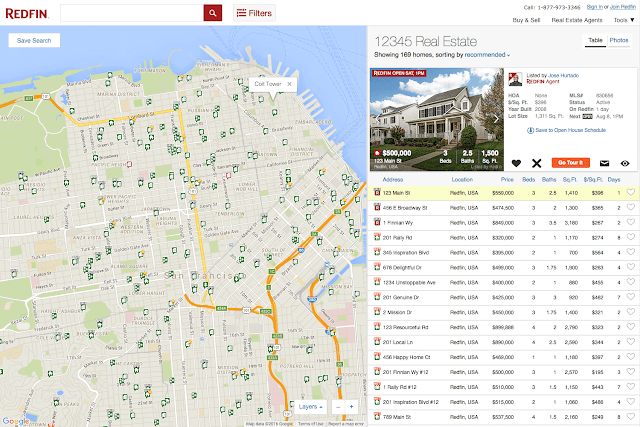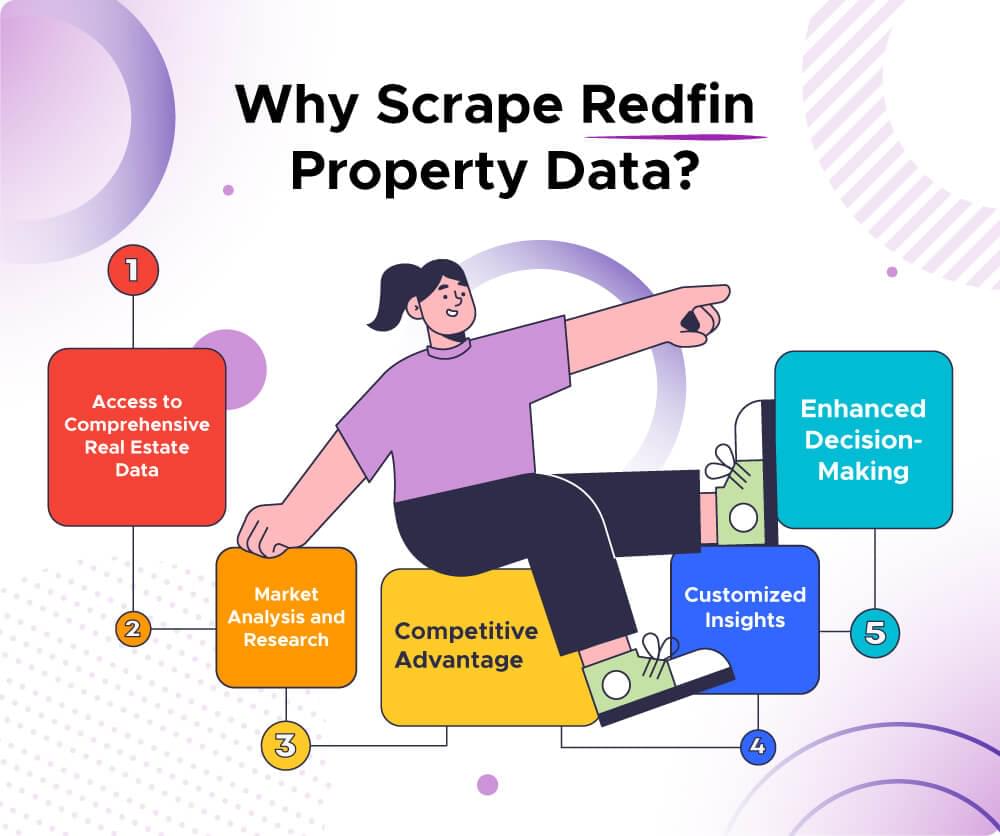
Redfin API and Web Scraping
Redfin API is a technology-powered real estate brokerage that provides comprehensive real estate services to consumers, leveraging advanced data analytics and a user-friendly platform to facilitate buying, selling, and renting properties.
Redfin offers two primary avenues for accessing property data: its API and Redin Scraper. The Redfin API provides structured data responses, making it a reliable method for developers needing programmatic access to real estate data such as property valuations, historical sales data, and neighborhood statistics. Users should note that, while using the API, they must comply with Redfin’s terms and conditions to avoid legality issues.
On the other hand, Redfin scraper is employed when the API does not meet specific data requirements or when users seek more detailed information. This approach involves writing scripts that extract data directly from the HTML of Redfin’s web pages. While web scraping can offer more granular insights, it comes with technical and ethical considerations. Users must ensure that their scraping activities do not breach Redfin’s terms of service and implement measures like rate limiting and respecting the site’s robots.txt file.
Whichever method one selects, the appropriate use of Redfin API and web scraping can yield significant property data insights, albeit with varying degrees of effort and risk management. Therefore, choosing the right approach is critical for both immediate needs and long-term objectives.

Image Source: Google Cloud Blog
Why Integrate Redfin API into Your Real Estate Business?
Integrating the Redfin API into a real estate business is an invaluable step that significantly enhances operational efficiency and market competitiveness. The API provides real-time access to a comprehensive database of property listings and detailed information that can streamline the data retrieval process.
By leveraging the powerful features of Redfin API, businesses can automate gathering and analyzing property data, eliminating the need for tedious manual entry and reducing the potential for human error. Additionally, the API supports advanced search functionality, enabling customized queries to meet specific business needs. Businesses can also offer sharper insights to clients by integrating Redfin’s extensive database, which includes pricing history, neighborhood data, and property status.
These capabilities ensure agents and brokers have the most current and comprehensive information at their fingertips, empowering them to offer better service and make more informed decisions. Furthermore, integrating Redfin API facilitates better resource allocation, allowing teams to focus on higher-value activities such as client engagement and strategy development. Ultimately, Redfin API integration is not just about gaining data access; it enriches the entire business process, elevates client trust, and drives long-term growth.

Image Source: Crawlbase
Advantages of Using Redfin API for Real Estate Data
- Comprehensive Data Access:
The Redfin API offers extensive access to real-time real estate data, including property details, historical sales, and neighborhood information. This allows users to gather detailed insights without the need for manual data collection.
- Accuracy and Reliability:
Since Redfin is a renowned real estate brokerage, its API provides highly accurate and reliable data. Unlike third-party data sources, Redfin ensures that the information is up-to-date and validated, ensuring credibility in research and analysis efforts.
- Customization and Flexibility:
The API provides various endpoints that enable tailored data retrieval, allowing users to customize queries according to their specific requirements. This makes it flexible for different use cases, from market analysis to specific property searches.
- Speed and Efficiency:
Automating data collection through the Redfin API significantly enhances speed and efficiency. Users can quickly retrieve large datasets with minimal manual intervention, freeing up valuable time for analysis and decision-making.
- Cost-Effective Solution:
Utilizing the Redfin API can be more cost-effective compared to other methods of data acquisition. It eliminates the need for maintaining web scrapers or subscribing to multiple costly data services.
- Integration Capabilities:
The API seamlessly integrates with various business intelligence tools, data analytics platforms, and other applications. This facilitates a streamlined workflow, making it easier to incorporate real estate data into existing systems.
- Scalability:
The Redfin API supports scalability, accommodating both small-scale inquiries and scalable data collection efforts. This ensures that businesses of all sizes can leverage the API to meet their data needs without compromising performance.
- Enhanced Analytical Insights:
By enabling comprehensive data collection, the Redfin API supports advanced analytics. Users can employ machine learning models, statistical analyses, and other techniques to uncover market trends, property valuation patterns, and investment opportunities.
- Security and Compliance:
Redfin prioritizes data security and compliance with industry standards. Users can trust that their data queries and the resulting datasets are handled with the highest security measures, protecting sensitive information and ensuring compliance with relevant regulations.
- Developer Support and Documentation:
Redfin provides robust developer support and thorough documentation for its API. This aids developers in integrating and utilizing the API efficiently, minimizing technical challenges and fostering a smooth implementation process.
How Redfin Scrapers and API Work Together for Richer Data?
Redfin scrapers significantly enhance the capabilities of the Redfin API by providing additional layers of detail and insight that might be missed through API calls alone. While the Redfin API offers a structured and efficient way to access property data such as pricing, location, and basic property features, scrapers excel in capturing nuanced information and user-generated content not readily available via the API.
For instance, scrapers can extract detailed descriptions, user reviews, high-resolution images, property history, and even detailed neighborhood discussions from the Redfin website. This capability allows for a more comprehensive and holistic view of the real estate market.
Additionally, certain real-time data points, such as updated open house dates and recent price changes, might not always reflect immediately in API responses but can be swiftly captured through scrapers. By leveraging both the Redfin API and scrapers, analysts and developers can create a robust data ecosystem that maximizes accuracy, depth, and timeliness.
Key advantages of combining Redfin scrapers with API include:
- Enhanced Data Accuracy: Scrapers can verify and cross-check data obtained from the API for inconsistencies.
- Granularity: Detailed attributes and comprehensive visuals enrich the data set.
- Timeliness: Real-time information can be more immediately captured, ensuring that data reflects the latest market changes.
- User-Generated Content: Reviews and discussions provide context that raw data cannot capture.
By integrating the structured, reliable data from Redfin’s API with the expansive, detailed information obtained through scrapers, stakeholders can gain unparalleled insights into the real estate market, enabling more informed decision-making and strategic planning.
What are the Key Features of Redfin API
The Redfin API offers a range of features that make it an essential tool for accessing detailed property data. Here are the key features:
- Property Search Capability: Allows users to conduct comprehensive searches based on various parameters like location, price range, and property type. This ensures precise results tailored to specific needs.
- Detailed Property Information: Provides extensive details about properties, including square footage, number of rooms, and amenities. This aids in thorough property assessments.
- Real-time Data Access: Ensures up-to-date information, which is vital for making informed decisions in a dynamic market.
- Market Trend Analytics: Offers insights into market trends, such as average pricing and price per square foot. This helps in tracking market movements and predicting future trends.
- Neighborhood Insights: Supplies data about the surrounding neighborhood, including local schools, crime rates, and amenities. This assists in evaluating the living conditions in the area.
- User Authentication: Requires secure user authentication, ensuring data privacy and access only to authorized users.
- Advanced Filtering Options: Provides multiple filtering options to narrow down search results, allowing for more targeted property searches.
- API Documentation and Support: Comes with thorough API documentation and support, making it easier for developers to integrate and use the API effectively.
- Data Accessibility: Allows for easy data extraction, which can be used for analysis and integration into other databases or software systems.
- Customizable Queries: Offers the flexibility to create custom queries to meet specific data requirements.
- High Response Speed: Ensures fast data retrieval, which is crucial for a smooth user experience.
- Integration with Other Tools: Can be integrated with other real estate tools and platforms to enhance functionality.
- Scalability: Designed to handle a large number of requests, making it suitable for both small and large-scale operations.
Implementing these features can significantly enhance the ability to retrieve and analyze property data, ultimately leading to better decision-making and strategic planning.
Data Types Available Through Redfin API
- Property Details
- Address: Full property listing address including street, city, and zip code.
- Price: Current listing price.
- Type: Type of property (single-family, condo, etc.).
- Status: Listing status (active, pending, sold).
- MLS Number: Multiple Listing Service number.
- Financial Details
- HOA Fees: Homeowners Association fees if applicable.
- Taxes: Property tax information.
- Price Per Square Foot: Cost per square foot based on listing price.
- Previous Sale Price: Last recorded sale price.
- Neighborhood Information
- Schools: Nearby school names and ratings.
- Crime Rates: Local crime statistics.
- Walk Score: Measure of walkability in the area.
- Commute Times: Estimated times for commutes to key locations.
- Nearby Amenities: Proximity to points of interest such as parks, grocery stores, and public transport.
- Market Trends
- Days on Market: Average number of days properties remain on the market.
- Price Trends: Historical pricing trends for similar properties.
- Inventory: Current inventory levels in the area.
- Rental Estimates: Estimated rental income if the property is rented out.
- Comparison Metrics
- Similar Properties: Details about comparable properties.
- Price Trends Comparison: Comparison of price trends with other areas.
- Property Appreciation: Rate of property value appreciation over time.
- Legal Information
- Zoning: Zoning laws applicable to the property.
- Property History: Historical details about the property including past owners and modifications.
- Legal Descriptions: Descriptions as per legal and tax records.
Building Effective Web Scrapers for Real Estate Data
Creating efficient web scrapers for real estate data, particularly when using platforms like Redfin, requires a strategic approach to ensure accuracy, reliability, and compliance with data usage policies. To start, developers must select the appropriate tools and libraries.
Commonly used libraries include Beautiful Soup for parsing HTML and requests for handling HTTP requests. It is crucial to understand the structure of the web pages being scraped, which can be achieved through tools like Chrome DevTools.
How Real Estate Businesses Can Utilize Redfin API and Scrapers
Real estate businesses can leverage Redfin API and scraping technologies to gain substantial market intelligence and improve operational efficiencies. Below are two examples illustrating their effective use:
1. Competitive Market Analysis
- Automated Data Collection:
- Using Redfin API, real estate agencies can automatically gather extensive data on property listings, including pricing, features, and sale history.
- Scrapers can extract additional metrics not directly accessible via the API, such as neighborhood conditions and nearby amenities.
- Comparative Market Insights:
- The gathered data assists in creating comprehensive comparative market analyses (CMA).
- Agencies can identify trends, median prices, time-on-market statistics, and price-per-square-foot by comparing multiple similar listings.
- This information aids in devising competitive pricing strategies and identifying lucrative property investment opportunities.
- Enhanced Client Services:
- By having up-to-date, detailed market insights readily available, agents can offer more accurate and immediate advice to clients regarding property buying and selling decisions.
- This boosts client confidence and satisfaction, leading to better client retention.
2. Property Portfolio Management
- Portfolio Tracking:
- Using Redfin API, businesses can continuously track the performance and value changes of each property within their portfolios.
- Scraper tools can update data more frequently than API limits, ensuring real-time information.
- Investment Analysis:
- Real estate investors can utilize scrapers to collect data on rental yields, occupancy rates, and local market conditions.
- This data supports making informed decisions about when to buy, sell, or renovate properties.
- Risk Mitigation:
- By monitoring listing and sales trends, an investor can identify early signs of market shifts.
- Leveraging prompt alerts and updates, businesses can mitigate risks by adjusting investment strategies in response to fluctuating market conditions.
- Data Visualization:
- Integrating Redfin API data with BI tools, firms can visualize portfolio performance through dashboards.
- Real-time dashboards help stakeholders quickly interpret data trends and make strategic decisions.
Ensuring the ethical use of scrapers and compliance with Redfin’s terms of service is crucial. Real estate businesses can achieve substantial efficiency gains and enhanced market understanding by integrating these tools effectively.
Tools and Resources to Enhance Your Real Estate Data Strategy
Leveraging various tools and resources can significantly boost the efficiency and effectiveness of a real estate data strategy. These tools offer advanced capabilities for data scraping, mining, analysis, and visualization, enabling professionals to gain deeper insights from property data.
Real Estate Data Tools
- PromptCloud
- Web Scraping: Helps extract real estate data from numerous websites, aiding in gathering extensive property information.
- Customizable Solutions: Offers tailored scraping solutions to meet specific data requirements for different real estate projects.
- High-Quality Data: Ensures that the data collected is clean, structured, and ready for immediate use in analysis and reporting.
- Tableau
- Data Visualization: Transforms raw data into intuitive visual dashboards, making it easier for stakeholders to understand key property trends and insights.
- Integration: Supports integration with various data sources, including databases and spreadsheets, for seamless data importation.
- Zillow API
- Property Data: Provides access to comprehensive property details, valuation estimates, and historical data.
- Market Trends: Offers insights into neighborhood statistics and market trends, aiding in accurate property analysis.
- Google Maps API
- Geolocation Data: Enables the inclusion of precise geolocation data to enhance property listings with interactive maps.
- Proximity Analysis: Assists in identifying nearby amenities, schools, and transport links, adding value to property insights.
Analytical and Reporting Tools
- Excel
- Data Manipulation: Useful for extensive data manipulation, including sorting, filtering, and pivot table creation.
- Charting Tools: Facilitates the creation of bar charts, histograms, and scatter plots to visualize data patterns effectively.
- R and Python
- Statistical Analysis: Powerful scripting languages for conducting sophisticated statistical analyses and predictive modeling.
- Libraries: Access to extensive libraries such as Pandas, NumPy, and ggplot2, which enhance data handling and visualization capabilities.
- Power BI
- Business Intelligence: Integrates diverse datasets and delivers detailed, interactive reports and dashboards.
- Collaboration: Enables easy sharing of insights and data reports within teams, strengthening decision-making processes.
Data Storage and Management
- AWS (Amazon Web Services)
- Cloud Storage: Offers scalable cloud storage solutions suitable for extensive real estate datasets.
- Data Security: Ensures robust data protection mechanisms, maintaining the confidentiality and integrity of property data.
- Google BigQuery
- Big Data Processing: Facilitates the handling of large-scale data processing tasks with minimal latency.
- SQL-Enabled: Allows SQL-based queries for extracting and analyzing real-time data quickly and efficiently.
Conclusion
Effectively leveraging a Redfin scraper can provide significant insights into property data, adding substantial value to real estate research and analysis. While the benefits are clear, implementing robust web scraping tools and ensuring that data extraction is legal and ethical can often pose challenges.
PromptCloud, a premier web scraping service, offers a convenient and efficient solution for obtaining accurate and comprehensive property data. Schedule a Demo today!



















